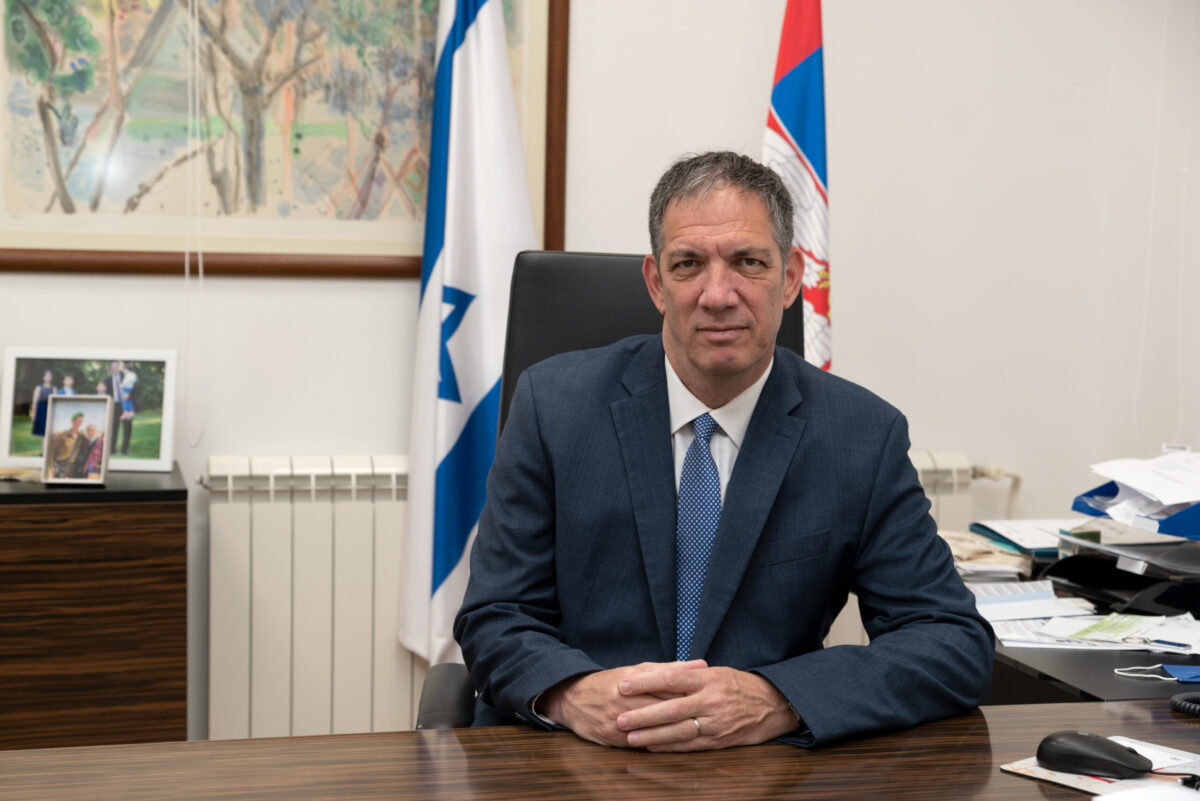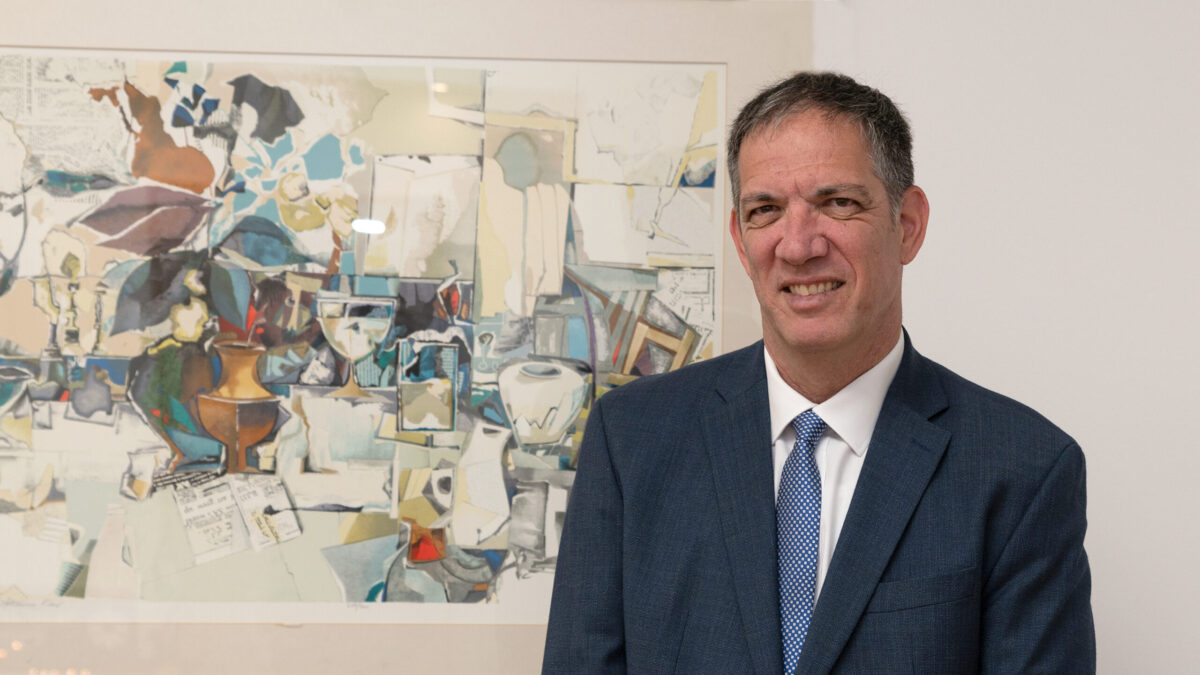Indeed, relations between our two peoples are much more long-lasting and have never been disrupted. Serbia is not a neighbour of Israel in a geographical sense but a neighbour in the heart.
In his interview, the Israeli Ambassador to Serbia, H.E. Yahel Vilan, speaks about marking the three decades since the re-establishment of the Serbian-Israeli relations, as well as the cooperation between the two countries, history, tourism and his life in Serbia.

What events is the Embassy planning to organize in 2022 to celebrate the anniversary of the re-establishment of the Israeli-Serbian relations?
The initial event was held in March when the embassy hosted a cocktail to mark 45 years since the Israeli basketball club Maccabi won its first European Champion title in Belgrade. Our main event was the concert by the Makris Symphony Orchestra, conducted by the Israeli maestro Nir Brand, held at Kolarac, on the occasion of the 74th Independence Day of Israel. For the last 18 years, the embassy has also been supporting Belgrade’s Dance Festival. This year, we had a famous Israeli dance ensemble, Bat Sheva, with its Three Performances by Ohad Naharin performing in Belgrade and Novi Sad.
We are extremely happy to see how sports connect our youth too. This June, over 100 young Israeli basketball players, both boys and girls, will have a chance to play basketball and get to know Belgrade by taking part in the Basketball Summer Cup. As part of our zealous donation activity, the Israeli Agency for International Development and Support, Mashav, has donated a valuable Blood Bank to the Clinical Center of Niš. This is the first Blood Bank in a hospital in Serbia which will raise the quality of medical service and operational capacity of the Clinical Center. As for the economic events, we will be having a Renewable Energy conference this month, the Israeli Cyber day, the Women in Cyber Conference, and the Day of Israel in Kragujevac with Hackathon on the topic of Promotion of the Jewish heritage of Kragujevac, together with the City of Kragujevac and Business Incubation Center. All of the events will celebrate 30 years of diplomatic relations between our two countries.
The friendship between the two peoples dates back much earlier than the founding of the State of Israel. Could you give us your take on the history of our friendly relations?
Indeed, relations between our two peoples are much more long-lasting and have never been disrupted. Serbia is not a neighbour of Israel in a geographical sense but a neighbour in the heart. Officially, the diplomatic relations between ex-Yugoslavia and the State of Israel were severed after the Six Days War in 1967, by the decision of the Government of Yugoslavia of that time. They were renewed on the level of Charge d’Affaires in autumn 1991, and in spring 1992, the Embassy of Yugoslavia was reopened in Tel Aviv. The first Yugoslav Ambassador to present his credentials in 1997 was the legendary Mirko Stefanović. Doctor David Albala, a Serbian patriot and a fervent Zionist who embodied the historic crossroad in our parallel journeys, was one of the most prominent figures in the shared Serbian-Israeli history. Some 105 years ago, on December 27th 1917, Zionism and Serbian national aspirations converged and resulted in Serbia being the first country in the world to endorse the Balfour Declaration.
Serbia’s Law on Restitution to the victims of the Holocaust with no live successors adopted in 2017 serves as a model to other European countries.
The founding father of the Zionism movement, Theodor Herzl, whose father was born in Zemun, is another important figure in Jewish history that connects Serbia and Israel. In August 1897, Theodor Herzl convened and chaired the first Zionist Congress in Basel. This event is considered a milestone in establishing a state based on the right to self-determination for the Jewish people in their historical homeland. On the occasion of the historic visit of the Israeli President Rivlin to Serbia in 2018, the two Presidents unveiled a street named after Theodor Herzl at the address where his father lived. Serbia’s Law on Restitution to the victims of the Holocaust with no live successors adopted in 2017 serves as a model to other European countries and is highly praised in Israel and among the largest Jewish organizations.

Just over half a year ago, the Chamber of Commerce and Industry of Serbia opened its office in Jerusalem. Why, do you think, this representation is important?
We see it as a valuable step forward in economic relations. It is the seventh representative office of the Chamber abroad aimed at expanding and deepening economic relations between Israel and Serbia, especially in areas of innovation, entrepreneurship and hi-tech. The office is very active in connecting two ecosystems so we hope to see tangible fruits of the joint effort in boosting our economic relations across different sectors.
Israeli companies have been investing in Serbia. Which economic segments do they usually invest the most in? What do they find appealing in Serbia, that is, what does the Embassy of Israel in Serbia advise them mostly about?
Real estate investments are the flagship of Israeli investments in Serbia. With more than EUR 2 billion invested in completed and ongoing projects such as office parks, retail parks, shopping malls, and residential and mixed-use premises, Israel is a leading real estate investor in the country. Our companies have been pioneers in launching concepts of office parks, retail parks and condominium residences, thus levelling up the quality of life for the people of Belgrade and Serbia.
Israeli companies did invest in other sectors as well such as precise castings for turbojets, coffee production and packaging, transportation, renewable energy, IT services and other. Every time I go and meet with Israeli investors like BIG who is enlarging their presence in the country with new developments or AFI who is developing new projects in Belgrade or any other, I’m witnessing their overwhelming optimism on economic perspectives of Serbia. Besides organizing specific events and conferences in bringing together Serbian and Israeli businesses the embassy is at the disposal for providing various information required when entering the Serbian market. Our efforts are also focused on diversifying the portfolio of Israeli investments in the country.
Serbia and Israel also cooperate on the Green Agenda, i.e. green energy, energy transition and carbonization process. How will this cooperation develop further?
Cooperation in the field of energy is on the rise, especially in the last 2-3 years. We signed an MOU on Cooperation in Green Energy. Serbia has an ambitious goal of achieving 40% of energy from renewable sources by 2040 and new regulations (laws and bylaws) which make the investment environment favorable. Israeli companies are eager to contribute to this goal by investing primarily in wind and solar energy. In Israel and around the world, there is a growing awareness of the importance of the shift to renewable energy – energy that originates from harnessing solar radiation, wind, biogas/biomass, earth’s heat and other sustainable natural resources. Reducing dependency on imported fuel contributes to the energy independence of any state. For Israel as an electric island – not connected to any grid, this is of strategic importance!
Real estate investments are the flagship of Israeli investments in Serbia.
Together with the Chamber of Commerce and Industry of Serbia and the Association of Renewable Energy of Serbia, this month we will hold a conference called ‘Renewable Energy: Serbia’s Potential – Opportunities for Israeli companies’.
As many as 40,000 Israeli tourists came to Serbia in 2017, which is a record number to this day. Now, as we are near the end of the pandemic, what do you think will happen with tourist visits? What is the most popular tourist destination in Serbia for Israeli tourists?
With the introduction of Israir’s and Arkia’s flights in the autumn of 2016, we saw a dramatic increase in the number of Israeli tourists going to Serbia which reached its peak in 2017, as you have mentioned. The pandemic has definitely brought these figures down and we do expect to see a recovery in the upcoming period, especially with the re-launch of direct flights. Belgrade and Novi Sad remain the most visited cities but we do have quite a few tourist groups visiting Zlatibor and Tara, according to the information from local travel agencies that have organized their stay. Upon resuming direct flights, we hope that the number of Israeli tourists in Serbia will match the pre-pandemic one.
What are the current relations between our two countries like? What moments would you like to single out since your arrival in Serbia?
As I mentioned in my first answer, luckily our relations are truly based on the very strong bonds between Serbs and Jews here in Serbia which paved the way for the friendship between our nations and countries in the past 30 years. Within this positive context, one could not ignore the fact that the last two years were not among the best, for very obvious reasons. And yet, I must say that for me, my strongest lesson from that period is very positive. I am proud to say that this special friendship between our people, which is way deeper and stronger than our common interests, has prevailed and I can now only look forward with great optimism to the years ahead.
Belgrade and Novi Sad remain the most visited cities but we do have quite a few tourist groups visiting Zlatibor and Tara, according to the information from local travel agencies that have organized their stay.
Alongside the political stability, which I wish for both countries and the end of the pandemic, I’m confident we’ll be able to achieve great success in what I believe is our main mission here – to translate this amazing friendship into much more tangible achievements in all aspects of life – political, economic, cultural and other.